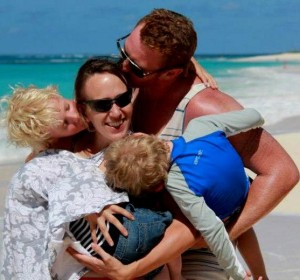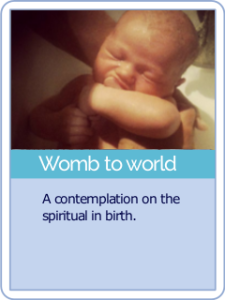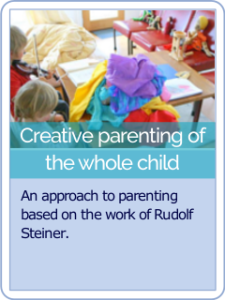Preparing for children: some thoughts
I t is in the thoughtful preparation for having children that the journey of parenthood really begins, a wonderful journey that will need your consciousness, your creativity and your courage. You will need to clarify what your values are, what you want for yourselves and your children, and how you are going to get there. Here are some areas to consider.
t is in the thoughtful preparation for having children that the journey of parenthood really begins, a wonderful journey that will need your consciousness, your creativity and your courage. You will need to clarify what your values are, what you want for yourselves and your children, and how you are going to get there. Here are some areas to consider.
View/download pdf Preparing
Getting informed
This is the time for you and your partner to inform yourselves about possibilities. Read books and articles and talk to as many people as possible to gather different perspectives on child birth, the joys and challenges in caring for children, on what children need and what the adults who care for them need. This will help you to find where you both stand— what you each feel comfortable with and what you are drawn to. To do all this you will need to make conscious effort and commitment. As you inform yourselves about what it means to be parents, use your creativity and imagination to consider what is possible and what you really want for your own children. What do you agree on? What do you disagree on and will have to work through? What sort of home do you want to welcome them into—considering both the physical and the emotional space you create?
Preparing the space & creating a safe haven
This is the time to find a home best suited to children. This would preferably be a place with access to nature, to natural play areas, gardens, parks and places with water and sandpits. Settle yourselves in this place before pregnancy if you can. Make a haven for yourselves where you feel comfort, peace and emotional warmth. A home as a safe haven is also one which nurtures us and protects us from today’s hurried, stressful, overstimulating world. Create a place where you can be stress free, calm and nourished by your love for each other, where gentle interactions, creativity, playfulness and conversation take precedence over gadgets and screen time. Create a place where a sensitive child, new to the world would want to come. Imagine what it would be like to be completely open in all your senses but with no ability yet to protect yourself. Create the sort of world which would protect and nurture you all. Conception, pregnancy, birth and early childhood need such an environment, if it is possible, to maximise the wellbeing of father, mother and child.
Pregnancy actually naturally prepares women to do all this, if they are just able to stop to listen to their bodies. When women are able to be sensitive to what their bodies are telling them, they will often do what their babies need. Unfortunately, needing to go on working in a stressful stimulating work world in pregnancy can make this listening difficult. The time of birth, and the month or so afterwards, also creates a very open, quite vulnerable space for mothers which is perhaps nature’s way of reminding us to give the new born the protection and quiet that it needs—if we will but listen to inner messages. If you can possibly give yourself the last few months of pregnancy to be more quiet and relaxed, to stop and listen, to follow your nesting instinct and create your safe haven, it will be a blessing for you all.
Of course this is the ideal, to find or make a beautiful environment for children and yourselves, to give yourself the time to fill it with love and calm. Not everyone has the ideal, but everyone can be creative in working out how to make available places better to live in, to make the most of time available. A patio or small garden can also be made into a miniature jungle. An apartment has its possibilities to be cosy, beautiful and more child friendly. I once knew a dedicated Australian couple in London who lived in an old, third floor apartment. They must have lugged half a ton of sand up the stairs in buckets so they could have a sandpit in one corner. That is dedicated imaginative parenting. They knew the value of sand play for young children. Time can be managed with priority for the things that nurture us, eliminating the unnecessary and the stress producing activities.
A reminder: if you are going to make changes to your living spaces and re-decorate, think about what materials may be toxic, especially if you are already pregnant. Some paints and glues are more volatile and toxic than others. You can get safer biologically based paints today.
Provide a healthy start to life
Prepare yourselves to be physically healthy so you can give the gift to your child of a physical body that is as healthy as it is possible for you to provide. This means optimizing your fertility health. With so many women delaying pregnancy into their thirties, it is especially important to prepare for children physically, and for both mother and father to optimise their heath in the few years before conception. This means getting good sleep and exercise, and eating healthy whole foods, and cutting down on (or eliminating) alcohol, smoking, drugs (legal and illegal), excess sugar, stress and so on. It means trying to live a healthy lifestyle. Australia has some of the world’s leading practitioners in natural fertility management, including Francesca Naish. They can guide you through this process of optimizing your fertility health. You can access books, resources and practitioners on www.fertility.com.au. Women need to know their bodies and their fertility cycles. Both parents need to understand when conception can happen, and when not. If women have been on chemical contraceptives, their natural cycles may have been disrupted for years and may need time to re-establish themselves. Go into a pregnancy together healthy and informed.
Home as a safe haven for love
Consider the nature of your relationship. Having children can be an incredibly stressful time and put serious pressure on relationships, with lack of sleep, less freedom, and often less money and fewer luxuries. Do not underestimate this. It is no coincidence that a lot of domestic violence begins in a woman’s pregnancy. The counterbalance to this stress is, of course, the joy and love children can bring. But having children rarely solves problems already existing between a couple; rather it has the tendency to exacerbate them. So, as much as possible, sort out your relationship challenges and differences before children come. Get to know each other well, and make sure you can accept each other for all your faults, and find ways to work with each other. Do you have conflicts in values about raising children? Use counselling and relationship building workshops to cement your friendship and work out compromises if need be.
Then having created a loving place to welcome your children into, when you are ready, solemnly, lovingly invite them to come to you. This is a sacred beginning for you all. A way to truly and consciously create a welcoming space.
Find your inner strength and courage
You will soon find that having children requires of you many ethical decisions, with risks to weigh up and values to take into consideration. When you are conscientious in your parenting this will take strength and courage. You can decide to just follow the current recommendations which often change over time (think first aid procedures here, which are constantly being updated as new information becomes available). Or you can consider carefully all the advice you are given and decide what is right for you, your child, your values and your circumstances, now. Remember what is ‘normal’ is not always healthy. Are you prepared to be part of the 10 or 20% to not do what is ‘normal’? Being different takes courage, but it also takes consciousness. M. Scott Peck describes this challenge in The Road Less Travelled saying, “…the process of making decisions with total awareness is often infinitely more painful than making decisions with blunted or no awareness… [therefore] The best decision makers are those who are willing to suffer the most over their decisions, but still retain their ability to be decisive.” (p 75-76) Being a parent can be a hard road when you make conscious individual decisions for your children. But you are there as their protectors, who love and know them best, and who better to make a conscientiously informed decision on their behalf than yourselves?
Therefore, you are going to need the courage to decide what you want to work towards and to be firm in your commitment to those goals. You need to be well informed. You will need to learn to listen to others but then assess what they have to offer in terms of your own values, take what is useful and be courageous enough to politely put aside what is not appropriate for you—without feeling any obligation to others no matter who they are, be they relatives, friends or professionals. You need to decide what is right for your baby. This is no easy task with friends and relations wanting to help you, (with the best of intentions), with commercial interests eager to get your custom, and professionals wanting you to take their advice (on decisions which may not always be as clear-cut as they would have you believe).
Remember to ask, too, who has an investment in your choosing one way over another. Big multinationals have shown no compunction in introducing formula milk to replace breast milk in Africa, despite this very often not being what is best and safest for babies in third world conditions. Some hospitals in the U.S.A. remove babies from their mothers ‘for observation’ after birth to avoid litigation, disrupting the necessary bonding process—a policy not in the best interests of mother or baby. Government regulations and medical recommendations are based on what is considered the best way to protect as many people as possible but not necessarily your individual child. These general recommendations come out of complex decision making processes, balancing demands of medical researchers, pharmaceutical companies, politicians and insufficient funding, as well as the pros and cons of each individual drug or procedure. Their aim is what is best for the greatest number of people and that does not mean necessarily what is best for an individual child in individual circumstances. We need to be aware of all these things when we make decisions on our children’s behalf.
It is also useful to remember that health information released to the public is aimed most at parents of average intelligence or less, not at discriminating, conscientious, well informed parents. For example, even some government officials have been known to acknowledge that they accept that some 5% of the parent population will legitimately conscientiously object to vaccination schedules. These are not the parents wise officials are concerned about because they know that these parents have made an effort to inform themselves about the issues. But that does not stop other people giving these parents a hard time. If you want to do what is best for your child and it goes against government regulations, current medical advice or what is presented as ‘normal’ for small children by commercial interests, you will have to be strong and courageous.
From the moment pregnancy is confirmed you will be faced with such decisions: a test for abnormality in the foetus or not; ultrasound (how soon, how often, if at all); place of birth, choice of practitioners who reflect your values; natural birth or elective caesarean; Vitamin K at birth or not; time for mother-child bonding provided for or not; breastfeeding (if at all possible) or formula; vaccinations, (which, in what doses – single or multiple – allopathic or homeopathic, when, how many, or not); first foods and their timing; simple natural activities or commercial toys; screen time or no screen time for babies?
Few of these things are simple. They may have risks and consequences either way. What do you choose for yourself and your child? What information, professionals, authorities, friends do you trust? You can go with what is ‘normal’ or ‘recommended’ or you can do the hard work to make an informed decision for yourself and your situation and find people who will support you, not undermine your decisions.
Be warned too that you may have to deal with a certain defensiveness in others when choosing your own path. People can feel affronted when you choose to do something which is different from what those people have chosen for their own children. This is a neurotic response and should be just recognised as such. Don’t take it personally. I suspect this defensive reaction is worse when it involves something that they know deep in their hearts is not good for children, like too much screen time. Or something they did not really think about at all. Perhaps they feel guilty when they see your firm commitment on an issue they would have liked to have done differently themselves. Whatever the reason, now is a good time to be firm in establishing a family guideline which has in it understanding and compassion: ‘Each family does what they think is best for their children. We can be different from others, and they can be different from us, and that is OK.’ If you choose to be on ‘The road less travelled’, know that there is great freedom in being different and individual, even eccentric or odd, in your choices. It means people cannot so easily expect ‘normal’ or ‘conventional’ things from you, or pigeonhole you. They are forced to take you as they find you, as you are.
So you see as a conscientious parent you will need consciousness, creativity and courage. This is not the easiest path to choose but it will be rewarded by knowing you have done the best you could for your child, in the most responsible way you could. All this preparation for children of course becomes ongoing work needed throughout parenthood—keeping yourself informed, keeping your home a beautiful, loving and child friendly place, putting time and effort into your own physical, emotional and mental well-being, putting time and effort into strengthening and deepening your relationship with your partner, and constantly challenging yourself to take the harder, yet far more rewarding path of being the conscious, creative and courageous parent. Be prepared but not daunted. Having children may be the most joyful, fulfilling, personal growth promoting task you ever do.
View/download pdf Preparing
Further reading
www.fertility.com.au for literature and support on optimising your fertility.
www.consciousparentingguide.com by Julie Le Gal Brodeur for a practical quick reference guide to pregnancy, birth and early childhood based on Steiner Waldorf principles.

